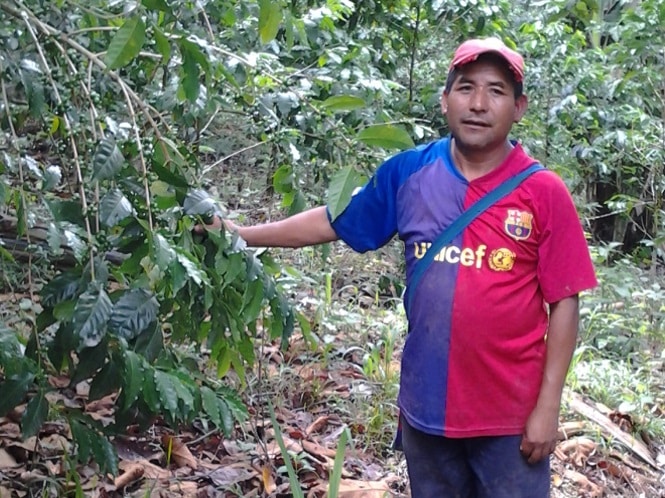
Member of Tziscao, a coffee cooperative in southern Mexico
In 2012 and 2013, Root Capital conducted a mobile data management project with Tziscao (pseudonym to protect the confidentiality of our client), a coffee cooperative client in southern Mexico. While not designed as an impact study, the engagement with Tziscao provided us with data pointing to the cooperative’s likely impacts on its farmer members, both in terms of improved livelihoods and environmental performance, as well as a window into Root Capital’s impact on the cooperative. The results are highlighted below and discussed in more detail in the full study.
Root Capital’s mission is to grow rural prosperity bysupporting agricultural businesses that build sustainable livelihoods in Africa and Latin America. These businessesare diverse, with various business models, working in different industries and contexts. Not surprisingly, their impacts are diverse as well, ranging in area, scale, and depth. These businesses exist on an impact spectrum – and some, while generating important benefits for their farmers and communities, have yet to maximize their impact potential. Part of Root Capital’s mission is to help our clients achieve their potential through improved business resilience, efficiency, and/or growth.
Given this spectrum of impacts, we have decided to start anonymizing individual client impact cases, so that we can openly discuss areas of improvement without affecting clients’ reputations. We also think there is value in sharing clients’ challenges with the broader impact investing community, to identify areas in which agricultural small-and-growing businesses may find more targeted support useful.
The Tziscao case is the first to use this new approach. Tziscao is a cooperative that sells organic- and fair trade-certified coffee from 485 farmers in the southern Mexican state of Chiapas. The cooperative was established in 2003 by local coffee farmers in response to unfavorable market conditions, including low market prices, high production costs, and limited productivity, and has been a Root Capital client since 2011. To date, Root Capital remains Tziscao’s only financier.
In 2012 and 2013, Root Capital partnered with Acopio, an organization specializing in mobile data management for coffee cooperatives, to help the enterprise digitize its inventory management system and internal farm inspections. The project was part of a larger, ongoing pilot using mobile data management platforms to generate actionable data for our clients alongside impact data for Root Capital and our partners.
The mobile pilot with Tziscao provided us with data pointing to the cooperative’s likely impacts on its farmer members – both in terms of improved livelihoods and environmental performance – as well Root Capital’s impact on the cooperative.
We found that Tziscao is having a moderate, although by no means immaterial, impact on the livelihoods and environmental performance of its members. Tziscao’s higher pricing has improved members’ incomes and livelihoods, but the cooperative does not provide its members with other services, such as credit or social programs, that would support further livelihood improvements. We also found that Root Capital financing has likely strengthened the business’ coffee buying operations.
Here are other key findings from the study:
Tziscao members earned more selling their coffee to the cooperative then they would have on the local market.
On average, members earned $410 more due to Tziscao’s price premium during the 2012-2013 coffee season, in a region where the average annual income is only $720. Producers reported using the extra income to pay for household needs such as food, clothing, medicine, and improved housing, as well as investment in their coffee farms. This incremental income is particularly important given that 72 percent of members reported experiencing regular food insecurity (over three months) in the past year.
The cooperative has likely improved members’ farming practices and environmental performance through agronomic training.
In surveys, members reported adopting several soil conservation practices since joining the cooperative, such as the use of compost to boost soil fertility. In some cases, members reported adopting these improved practices due to cooperative training. We cannot speak conclusively to Tziscao’s impacts here, however, as we did not explicitly ask producers why they adopted certain practices.
This project was the first time that Root Capital has evaluated our clients’ impacts on farmers’ environmental performance, looking at changes in agronomic practices that have been identified as proxies for positive environmental outcomes at the farm-level. We look forward to sharing more on findings related to environmental performance, as well as on our general approach to environmental impact assessment, in an upcoming blog.
Root Capital financing has likely strengthened the relationship between the cooperative and its members.
Root Capital, as Tziscao’s only lender, plays an important role in supporting the cooperative’s operations and impact. Tziscao management reported that Root Capital financing has enabled the cooperative to start providing advance payments to its members upon delivery of their coffee, rather than paying them several months later at the end of the coffee season. From impact studies and field experience, we know that this transition in payment timing can enable cash-poor farmers to sell more of their coffee to the cooperative rather than to middlemen (who offer lower prices than Tziscao, but in cash), ultimately resulting in higher incomes for members.
Tziscao’s moderate impact is likely representative of many of our younger coffee cooperative clients operating in markets with intermediaries that pay farmers at or below market rates. Root Capital remains committed to accompanying earlier-stage businesses like Tziscao in their growth, as they work to strengthen their business and scale their impacts.

